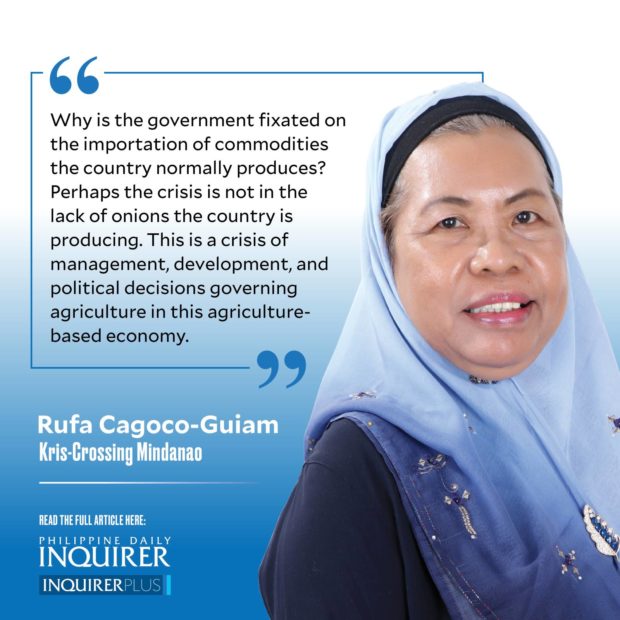In ‘onion’ there is strength
 No, this is not a typographical error. This is a pun on the oft-repeated slogan to unify people for a certain goal, “In union, there is strength.” The pun on the onion (scientific name: allium cepa) is attributed to its alleged aphrodisiac benefits, according to popular lore. Some people call it “bulb onion” or “shallot” to differentiate it from “green onions,” the variety sold with its green leaves. There are red onion bulbs as well as white ones. The latter has been the subject of controversy lately, as several tons of imported white onions somehow managed to enter the country as “smuggled” goods.
No, this is not a typographical error. This is a pun on the oft-repeated slogan to unify people for a certain goal, “In union, there is strength.” The pun on the onion (scientific name: allium cepa) is attributed to its alleged aphrodisiac benefits, according to popular lore. Some people call it “bulb onion” or “shallot” to differentiate it from “green onions,” the variety sold with its green leaves. There are red onion bulbs as well as white ones. The latter has been the subject of controversy lately, as several tons of imported white onions somehow managed to enter the country as “smuggled” goods.
On Dec. 4, 2022, the Philippine Daily Inquirer reported that 100,000 kilograms or 100 metric tons of smuggled white onions, misdeclared as bread and pastries in the shipping documents, were seized at the Manila International Container Port last Nov. 29. These smuggled onions were estimated at P30 million. Later, authorities from the Department of Agriculture (DA) announced that these onions are not safe to use because they are contaminated with some transboundary diseases that make them “unsafe for human consumption.” Earlier, the DA had thought of easing up the steep prices of locally produced red onions through the sale of these smuggled white onions at much lower prices just before the peak of the holiday season. But after a series of phytosanitary analyses of a sample of the smuggled onions, the DA decided not to sell it in the Kadiwa or any market in the country.
And this was not an isolated case of seized smuggled white onions. On Dec. 2, a warehouse in Tondo, Manila, was discovered to have kept 1,147 bags of white onions worth P2 million.
Article continues after this advertisementAlbay Rep. Joey Salceda has remarked on national television that he has “Class A information” on a Chinese cartel that controls the smuggling of onions to the country. If so, why is there no report about the members of this alleged Chinese cartel so they can be charged appropriately in court? For this, and for previous smuggling cases, why has no one been charged with this crime?
But if white onions are not locally produced, why are markets in many parts of the country selling this type of onions, at the same price as the very expensive local red onions? Does this mean that some of the smuggled white onions, deemed unsafe for human consumption by the DA, have found their way into smaller local markets in the country?
These and other controversies associated with onions make us consider them not only from a culinary perspective, but also from a governance one. One prominent television host has repeatedly remarked that the runaway prices of this once lowly ingredient of many dishes are a manifestation of “bad governance.”
Article continues after this advertisementSpikes in the prices of both red and white onions were rife during the holiday season, and as the one mainly doing the cooking in our small household, I felt the crunch of the steep prices of onions here in General Santos City, which ranged from P450 (for the small sized ones, similar to the size of a quail’s egg) to a whopping P750 for the larger bulbs.
But as of Jan. 5, 2023, prices of onions are still in the P400-P650 range.
A few days ago, we all heard of the government’s plans to import red onions, to somehow infuse or even flood the market with red onions, in order to bring down the prices to the P100-P200 level. This strategy is quite familiar. Remember the government’s immediate answer to the sugar crisis?
Why is the government fixated on the importation of commodities the country normally produces? Why has the government not yet developed long-term plans for agriculture in our agriculture-based economy? Why are rural, impoverished farmers not made to participate in planning for agricultural development? Why are bureaucrats in their comfortable, air-conditioned offices and homes the only ones planning for agricultural development?
Perhaps the crisis is not in the lack of onions the country is producing. This is a crisis of management, development, and political decisions governing agriculture in this agriculture-based economy.
Comments to rcguiam@gmail.com
















